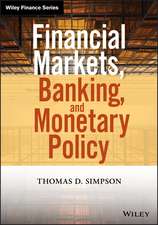The Evolution of Creditary Structures and Controls
Autor G. Gardineren Limba Engleză Hardback – 13 apr 2006
Preț: 588.33 lei
Preț vechi: 639.48 lei
-8% Nou
Puncte Express: 882
Preț estimativ în valută:
112.59€ • 116.83$ • 94.11£
112.59€ • 116.83$ • 94.11£
Carte tipărită la comandă
Livrare economică 12-18 martie
Preluare comenzi: 021 569.72.76
Specificații
ISBN-13: 9781403987532
ISBN-10: 140398753X
Pagini: 304
Ilustrații: XIV, 277 p.
Dimensiuni: 140 x 216 x 21 mm
Greutate: 0.46 kg
Ediția:2006
Editura: Palgrave Macmillan UK
Colecția Palgrave Macmillan
Locul publicării:London, United Kingdom
ISBN-10: 140398753X
Pagini: 304
Ilustrații: XIV, 277 p.
Dimensiuni: 140 x 216 x 21 mm
Greutate: 0.46 kg
Ediția:2006
Editura: Palgrave Macmillan UK
Colecția Palgrave Macmillan
Locul publicării:London, United Kingdom
Cuprins
Suppositions and Truths Modern Monetarism The Theory of Monetarism Credit Control by Interest Rates Credit Control by Reserve Assets Credit Control by Special Deposits Credit Control by Overfunding The Basel Capital Accord The Currency Principle Irving Fisher's Equation The Unintended Consequences of Taxes Savings, Investment and Debt Eruptions of Credit Planning or the Market Creditary Economics 101 Principles of Creditary Economics Appendices
Recenzii
'In this epoch-making book for banking and credit theory, Geoffrey Gardiner dismantles what remains of today's mainstream monetarist theory just as Thomas Tooke laid waste to Ricardian monetarism in the mid-19th century. He backs it up with a vast, and entertaining, historical and empirical exposition of the fallacies underlying much of today's mainstream monetarist analysis by using his experience as a leading banker.' - Michael Hudson, Professor of Economics, University of Missouri, USA
'Geoffrey Gardiner's Preface begins with a quote from A. Mitchell Innes, 'Credit and credit alone is money.' In a brilliant and entertaining tour de force he leads the reader through the 'principal truths of monetary theory' that follow on from that simple statement. He insists that money did not originate in barter, arguing that from the beginning what people exchanged was not goods but promises to supply goods. He then embarks on a journey through the evolution of creditary structures and controls from Babylonian accounting to the Basle Capital Accord. He offers an integration of the credit approach of Innes and the state money approach of Georg Friedrich Knapp as an alternative to the 'miasma of Monetarism' that prevented development of a clear understanding of credit, money, and interest over the past half-century.' L. Randall Wray, Professor of Economics, University of Missouri, USA
'Geoffrey Gardiner's Preface begins with a quote from A. Mitchell Innes, 'Credit and credit alone is money.' In a brilliant and entertaining tour de force he leads the reader through the 'principal truths of monetary theory' that follow on from that simple statement. He insists that money did not originate in barter, arguing that from the beginning what people exchanged was not goods but promises to supply goods. He then embarks on a journey through the evolution of creditary structures and controls from Babylonian accounting to the Basle Capital Accord. He offers an integration of the credit approach of Innes and the state money approach of Georg Friedrich Knapp as an alternative to the 'miasma of Monetarism' that prevented development of a clear understanding of credit, money, and interest over the past half-century.' L. Randall Wray, Professor of Economics, University of Missouri, USA
Notă biografică
GEOFFREY W. GARDINER is a Former Manager in the Financial Services Division of the Barclays Group.












